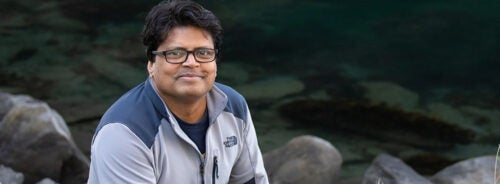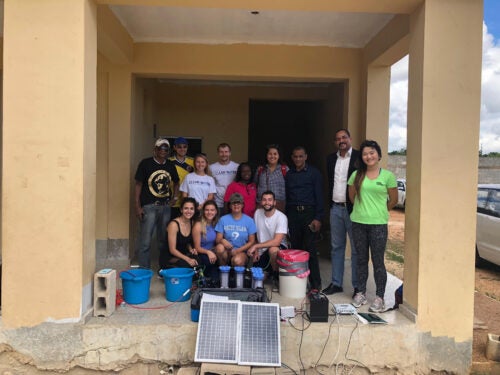The United Nations has observed World Water Day annually on March 22 since 1993. It’s a global celebration of water and recognition to raise awareness of the 2.2 billion people living without access to safe drinking water. Every year, UN-Water, the UN’s coordination mechanism on water and sanitation — sets the theme for World Water Day. This year’s theme will be Leveraging Water for Peace. Water is in direct relation to hunger, health, education, livelihoods, sustainability and ecosystems. Water resources are not only vital, but they are finite. Warming temperatures and other natural and human-made stressors threaten the quantity and quality of our water on a large scale.
The global urban population faces water scarcity that is projected to double from 930 million in 2016 to 1.7–2.4 billion people in 2050. The necessity for solutions for more sustainable water practices is increasing. A team of researchers at University of Rhode Island’s (URI) Water for the World lab are dedicated to the mission to develop, implement and evaluate efficient, safe and clean technologies to provide safe water for society. These College of Engineering professors contribute to the goal of clean water for all from designing portable filtration systems, assessing the effectiveness of water filters, and partnering with communities around the world.
URI Engineering Expertise for a Global Challenge

The need to study and identify water quantity is essential in addressing the problem. Ali Shafqat Akanda, URI associate professor and graduate director for the civil and environmental engineering department, uses data from geographic information systems software and remote sensing from satellites to map out water sources and how that quantity is affected by climate changes or natural disasters. Akanda then utilizes the information to create risk assessments. “With climate change, water scarcity is becoming a bigger problem in many places, and at the same time, too much water is an increasing problem” says Akanda. “The water crisis has tremendous impacts on public health.” Computer modeling is especially critical to track and assess water in underdeveloped nations with limited resources where water-borne diseases such as typhoid and cholera sicken millions annually. These tools can provide early warnings systems for those affected and alert government agencies and organizational aid for areas in need. Akanda developed a smartphone application that can provide information about water quality and risk levels of illness to those living in the areas and sourcing their daily water specified locations. The app also provides tips to treat water for healthy consumption and usage to prevent illness. Educating the population on clean water practices can prevent health crises where medical care isn’t easily accessible.
“There’s much more collaboration between the water community and the health community now than there was before and I am hopeful there will be more joint programs to help fully understand the grasp of the problems we face,” says Akanda.
“Most of the developing world is struggling with water challenges every day, whether it be water access, water quality and then related problems of food security and their health related to water,” said Akanda as his driving motivator for his research. The global urban population facing water scarcity is projected to double from 930 million in 2016 to 1.7–2.4 billion people in 2050.
Globally, 2 billion people do not have safe drinking water and 3.6 billion lack access to safely managed sanitation.
URI associate professor Joseph Goodwill uses chemistry and physics to improve water quality and tests methods in which it’s possible to do so on large scales. Establishing methods to make water safe needs to be as straightforward as possible if it is to make the most impact.
“One of our main goals is to develop simpler technologies that perform just as well as more complex approaches,” says Goodwill. His team focuses on advanced oxidation processes, chemical treatments that can eradicate harmful bacteria and emerging micropollutants from water. The added necessity being that the treatment is something that’d be readily available and low-cost, making it accessible for all.
Goodwill is taking his research to the University of Trento in Italy after being named a 2023 U.S. Fulbright Scholar. For the next three months, he will share his expertise with researchers abroad to bring better water quality to areas that may not have the funds or the structure in place for extensive changes in existing water systems.
URI professor and associate dean of research Vinka Craver focuses much of her research on life cycle assessment and water’s integral part in that. She studies impacts of nanomaterials on the biological systems and microorganisms that can disinfect water.

“Water is so critical, it is essential for all of us, but most people don’t know much about where it comes from or how it is treated,” said Craver. This is often due to the infrastructure being primarily unseen. The fundamentals on how we treat wastewater hasn’t changed that much in the last hundred years and it can be a huge strain on energy and resources. “It is an energy intensive process, but not one that can easily be changed,” said Craver.
Craver teaches her students to always complete life cycle assessments on solutions to problems, to have the right claims and assess the cost of solutions to make better, informed decisions. Many times, what works for one location doesn’t work for another, or a solution may fix one problem, but cause another later.
Her fieldwork has helped manufacture inexpensive ceramic water filters in remote villages around the world. She worked with non-profit organizations to find ways to improve ceramic water filters produced in rural communities in the global south. This form of simple technology is a way to filter water with materials sourced and manufactured locally and easily placed inside homes. These kinds of filtration systems require very little energy and resources.
Craver’s latest studies have been on nanoparticles and the effect on molecular-level changes in microorganisms. She also has been researching how plastic pollution is affecting water and identification methods of microplastics and additives in wastewater and drinking water and marine environments.
Water unites the world. It is a global cycle necessary for life on Earth, but also disconsonant with human impact. The United Nations sustainable development goal for clean water and sanitation for all requires new strategies that researchers here at URI’s World for Water Lab make the mission of their research. These include promoting innovation and evidence-based action and adopting more feasible and conservative water management.
By recognizing World Water Day, people can begin to take year-round actions to achieve these goals together by educating themselves on where their water comes from, where it goes after use, practicing conservation and understanding that not everyone has easy access to clean water and that has far-reaching impacts.
Learn more about the College of Engineering’s Water for the World lab at URI here.
Story by Krysta Murray
